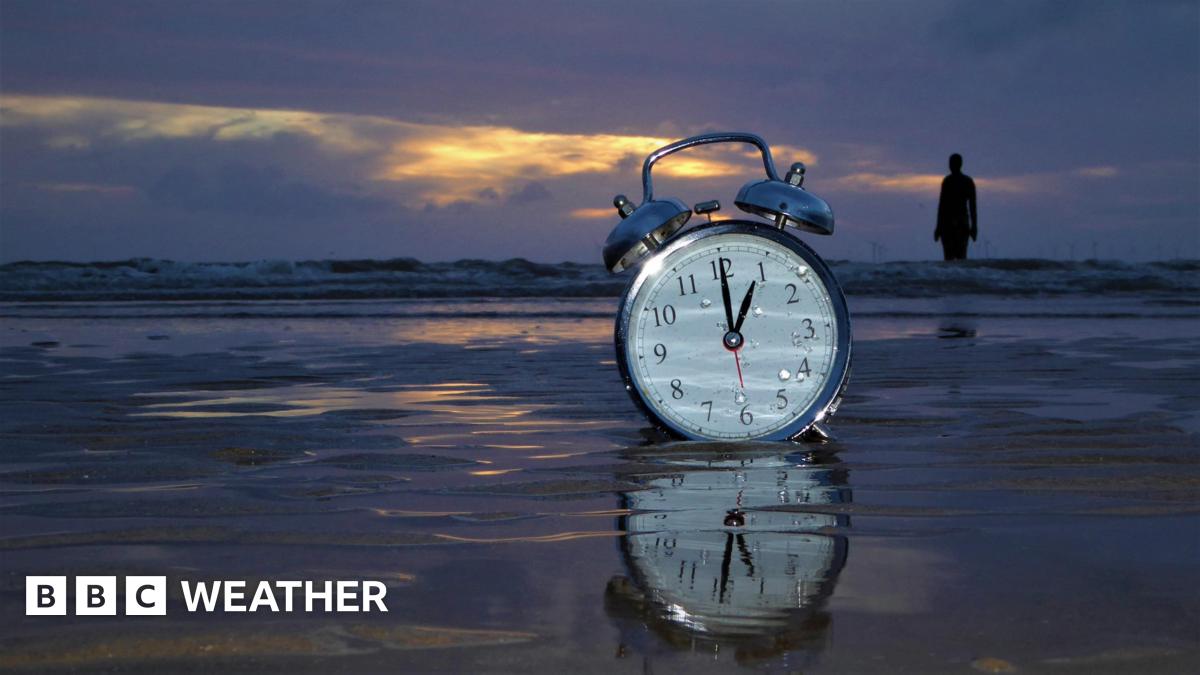
Clocks will go forward by an hour this Sunday 30 March at 01:00 GMT. This marks the end of Greenwich Mean Time (GMT) and the start of British Summer Time (BST) or Daylight Saving Time (DST). If you struggle to remember which way the clocks change, then this saying might help ‘Spring forward, fall back’. Sadly, for those of us who like a lie-in on a Sunday morning, the clock change in spring does mean we get one hour less sleep. Now the spring equinox has passed, we’re seeing more than 12 hours of daylight in most of the Northern Hemisphere. The clock change will mean sunrise effectively takes place an hour later. Initially, early risers will notice darker mornings following the clock change. The evenings however will be lighter as the sun sets later. As both sunrise and sunset times extend, the UK will end up with almost 19 hours of daylight in the north of Scotland at the summer solstice on 21 June. You can check the sunrise and sunset times for your local area on BBC Weather online or on the app. Benjamin Franklin, the founding father and inventor, first proposed daylight saving in 1784. It was seen as a cunning way to save on candles. Daylight Saving Time (DST) – the process of moving clocks forward by one hour in the summer – was started in Germany in 1916. During World War One it was a way to save energy resources such as coal, using fewer electric lights and less heating during the lighter evenings and being more productive. Weeks after Germany introduced DST, other countries adopted the idea, including the UK, where it was named British Summer Time (BST). During World War Two, the UK introduced British Double Summer Time when clocks were advanced two hours. This meant that during winter, while clocks went back an hour, they were still one hour ahead of GMT to increase productivity during daylight. Digital clocks have made things easier by changing the time automatically In the UK, as in most of Europe, the clock moves forward on the last weekend of March and back an hour on the last weekend of October but not every country observes the same dates. In the US, clocks moved forward on 9 March and will fall back again on 3 November 2025 – a week after the UK. Arizona and Hawaii are the only two states that don’t observe DST. For countries on the equator, where daylight hours stay roughly the same throughout the year, daylight saving offers no real benefit. And in Australia, as winter moves closer, clocks will go back on 6 April. All but one location shifts clocks by one full hour. Lord Howe Island, off the east-coast adjusts its time by just 30 minutes (putting it in the same time zone as New South Wales during summer). Places around the world that opt out of daylight savings – and why In Inverness, daylight hours in June can be up to 11 hours, 26 minutes longer than in December. One of the biggest arguments for British Summer Time is that road traffic accidents decrease substantially in the lighter evenings during summer. Back in 1968 there was a three year experiment to keep British Summer Time in place throughout the year. On average, there was a huge reduction in road casualties but this has since been attributed to new drink-driving legislation in 1967. In northern Scotland however, there was a net increase in the number of people killed or seriously injured on the roads. During the darkest days of December, sunrise would not take place until 10am in some places. Proposals to keep the United Kingdom on BST during the winter have been resisted by the Scottish government. There are currently no plans to change daylight saving in the UK. Some argue that changing the clocks twice a year is like giving the whole population a minor jet lag with losing an hour of sleep in spring having an effect on our mental state, especially the day after. At least remembering to put your clocks forward has become easier since the advent of the smart phone which updates the time automatically. UK weather: Turning cooler but could April start warm? Spectacular Northern Lights shine across the UK Comments can not be loaded To load Comments you need to enable JavaScript in your browser Spring warmth to make comeback in UK with temperatures set to climb above 20C How to watch Saturday’s partial solar eclipse When do the clocks go forward? Weather for the Week Ahead. VideoWeather for the Week Ahead Watch: How the South Korea wildfires became so deadly. VideoWatch: How the South Korea wildfires became so deadly Chris and Xand van Tulleken explore willpower Daisy May Cooper’s brilliantly twisted comedy thriller The role and purpose of libraries in the digital age A sneak peek into Stacey Solomon and Joe Swash ‘s life Copyright © 2025 BBC. The BBC is not responsible for the content of external sites. Read about our approach to external linking.
Attribution:
This article was summarized and republished from the original source.
Please check the original article here: https://www.bbc.com/weather/articles/cq5z7gj0yeyo.